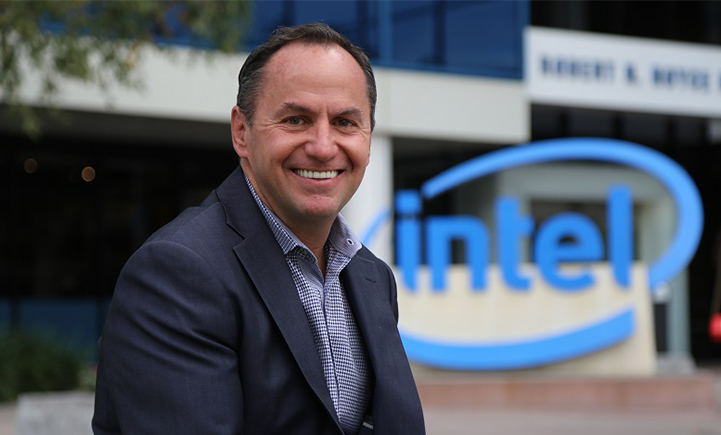Q&A with Binghamton University alumnus Bob Swan, MBA ’85, CEO of Intel
Swan earned his MBA from Binghamton University's School of Management

Born and raised in Syracuse, N.Y., Bob Swan earned his MBA from Binghamton University’s School of Management. A dynamic career has followed, and Swan now serves as the CEO of Intel.
In a conversation in September 2019, Swan discussed the impact Binghamton had on his career as well as the lessons he’s learned since.
What spawned your interest in studying business?
My dad owned a little jewelry store, and, growing up, I watched him and my uncle run the business. I also loved numbers. My dad encouraged me to go to business school because it gives you a platform to do whatever you want to do. It doesn’t narrow your choices, it gives you more choice. You can apply business to anything.
Why did you settle on Binghamton to earn your MBA?
There are a handful of schools that have a phenomenal reputation for business education in upstate New York, and Binghamton is one of them. Beyond that, the School of Management gave me a graduate assistantship, which allowed me to work to pay the bills.
What experiences at Binghamton had the largest impact on you?
There was a team-based program where you ran a business. Each team member would have a role, whether it was CEO, CFO or CMO, and you had to make a series of business decisions to plug into a system. The system would then determine outcomes, and you could see how your decisions would either help or harm the growth of the business.
I also played rugby, which is the quintessential team sport. I noticed common themes between rugby and my business classes. When you’re on a team, how do you assess the competition and identify their weaknesses? How do you identify your team’s strengths?
The campus allows for so many ways to experiment. I felt like I was getting classroom and sort of on-the-job training through the team sport of rugby.
Did you leave Binghamton feeling ready for the real world?
I didn’t really know what the next step was, but the University provided a forum to learn and grow. I took some night courses where the teachers would bring executives from GE, Link and IBM in to speak. The dialogue and debate that would happen between these three different companies with three different cultures was instrumental for me in thinking about the kind of company culture I’d want to join. I felt like I had a very solid foundation by the end of my time at Binghamton.
Based on what you’ve learned over your career, what are the skills you’d teach business students today?
There are three: change management, teamwork and critical thinking.
What I’ve learned to be an ingredient of success is to make whatever you’ve inherited better than what it was before. And that means change. Business is about making things better, not keeping things the same. If you stay the same, you lose competitive advantage. Change management is a skill that is extremely transferable, no matter what your job or industry.
For teamwork, I learned at Binghamton that business is a team sport. The best classes were the ones where you had to work with others. Sometimes it made the class harder, but it’s about how good you make those around you, not just how good you are yourself.
And, finally, critical thinking is a very generic skill, but it’s extremely relevant, no matter what you end up deciding to do.
Do you have a proudest moment?
I think the proudest thing for me is balancing the important stuff in life, which is family, with building a career. My wife and children keep me centered. To them, my title is husband or dad, and that’s the centering part, no matter what I accomplish large or small in my career.
What business lessons did you learn from your father?
You have to know your customers and make sure you’re trying to solve their problems. That’s foundational.
The other is to treat others the way you want to be treated. That’s a life skill, it’s an attitude and that’s how I was raised. Your role when joining a new environment is to make it better. Start with a fundamental and utmost respect for what was created before you got there and add an incredible desire to make it better because of your presence.
If you had to give one piece of advice to current SOM students, what would it be?
When I was a student, I couldn’t wait until I knew everything. But then I realized that when you know everything, you’re not growing. Learning and growing comes from being curious about your surroundings. The rate of individual growth is a function of your desire to want to learn more, not how much you try to show what you know.
A big differentiator for me when we hire people right out of school is whether they come in with a desire to continue learning and are comfortable asking questions as opposed to trying to show how smart they are.
Intellectual curiosity is a wonderful and powerful thing to help you grow and develop and evolve over time. Binghamton creates a great environment for this. Take advantage of it.
